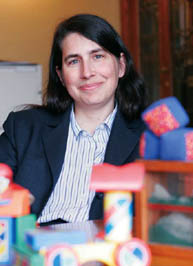By Chris Atack
Globalization puts new pressures on working families

In Tegucigalpa, Honduras, 19-year-old Gabriella works in a sweatshop at least 15 hours a day, seven days a week, earning the equivalent of $26 US a week. Her husband was recently robbed and killed by bandits, and her mother died of cancer. She is the only adult in her family. Her 10-year-old stepsister looks after her toddler in a tiny second-floor room, accessible only by a ladder that leans on the outside wall. If her stepsister goes back to school, Gabriella’s child will be left alone all day. If she doesn’t attend school, she, too, is destined for the sweatshop.
“And please don’t think that no family leaves a toddler alone all day,” says Jody Heymann, founding director of McGill’s Institute for Health and Social Policy and a pediatrician with a PhD in public policy. Heymann, cross-appointed to both medicine and political science, interviewed Gabriella and numerous neighbours in similar situations, many of whom had to leave their children alone all day as they worked—often with dire consequences. “A number of the children had been killed—burned to death or killed in falls. It’s people like these who brought me into this area of research. For me, the important thing is Gabriella’s story—and how to change it.”

Heymann is North America’s pre-eminent expert on the plight of working families. In July of 2005, she came to McGill from Harvard, where for the last seven years she and her team have conducted thousands of interviews with families in the United States, Mexico, Honduras, Botswana, Vietnam and Russia, analyzed survey data from households in eight countries and reviewed laws and labour codes in 170 countries. The results were published this year in Forgotten Families: Ending the Growing Crisis Confronting Children and Working Parents in the Global Economy (Oxford University Press).
“While conditions are worse in developing countries, core issues are universal,” says Heymann. “Working parents the world over must find child care during the day, especially when a child gets sick. When I present our research without country identifiers, experts sometimes can’t tell if data is from Mexico or Vietnam or Canada.”
The developed world doesn’t necessarily have more developed social policies. For instance, Vietnam has made a commitment to early childhood education and has legislated sick leave for parents of children under age seven. As a result, fewer parents leave sick children home alone in Ho Chi Minh City than in Baltimore.
Many of the problems facing poor working families stem from the fact that major social changes occur without the public policy adjustments that are needed to cope with the resulting upheaval. This past century has seen first the mass entry of men, then women, into the industrial and post-industrial labour force, and increased urbanization, which has taken people away from extended families. So far, Heymann says, social policy has not kept pace with the transformation in how society looks after families.
“These changes have yielded greater opportunities to escape poverty and increase gender equality, but they have also transformed how we care for children and the elderly,” says Heymann. “Policies haven’t evolved yet, but that doesn’t mean they can’t. Workable solutions do exist. For example, Quebec has an early childhood care program which is remarkably effective in reaching large numbers of kids.”
By documenting what needs to be done and which social policies actually work, Heymann hopes her research will make it out of the university and into the hands of decision-makers. Already, her research on working poor families in the United States has helped reach those who need it most, providing the academic weight to the push that led to the country’s first paid sick leave legislation, in California.
Heymann has seen poverty close up in places as diverse as New York City, rural Tanzania and Central American refugee camps. “Once you live in these places and meet the people there, you can never forget how important it is to work for change,” she says. “You also realize that the most effective programs are always collaborative. You’re always learning as much as you’re giving. If you’re not learning, I don’t think you can be helpful.”
Dr. Heymann is the Canada Research Chair in Global Health and Social Policy.
